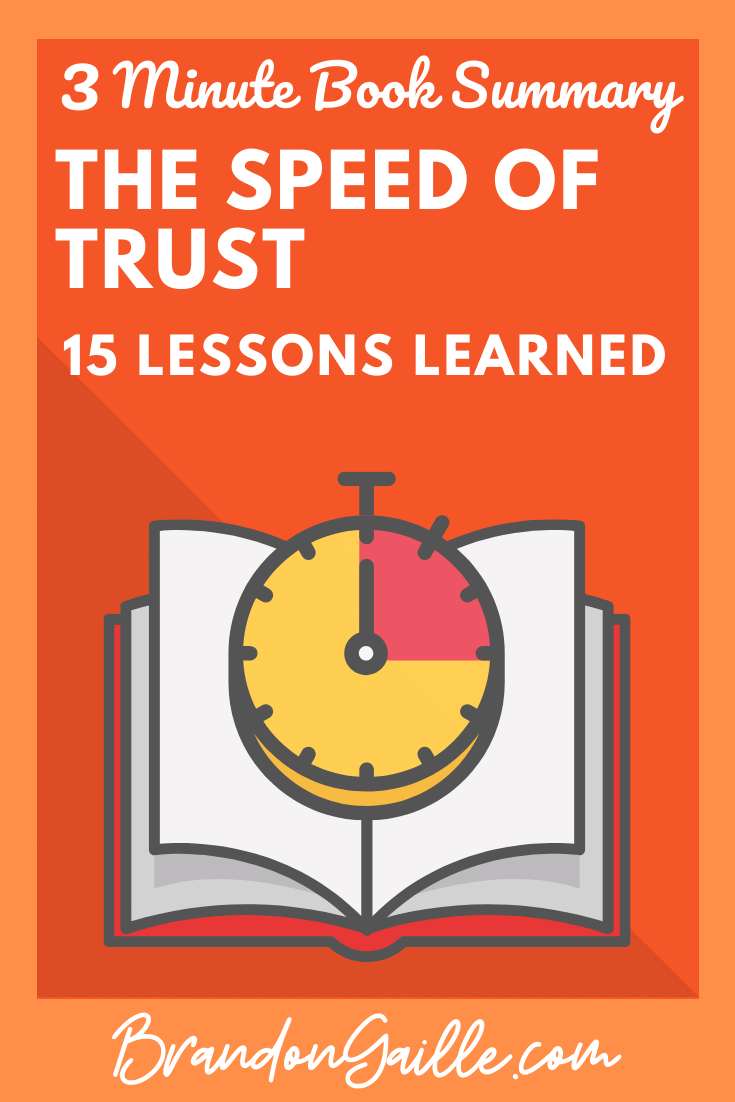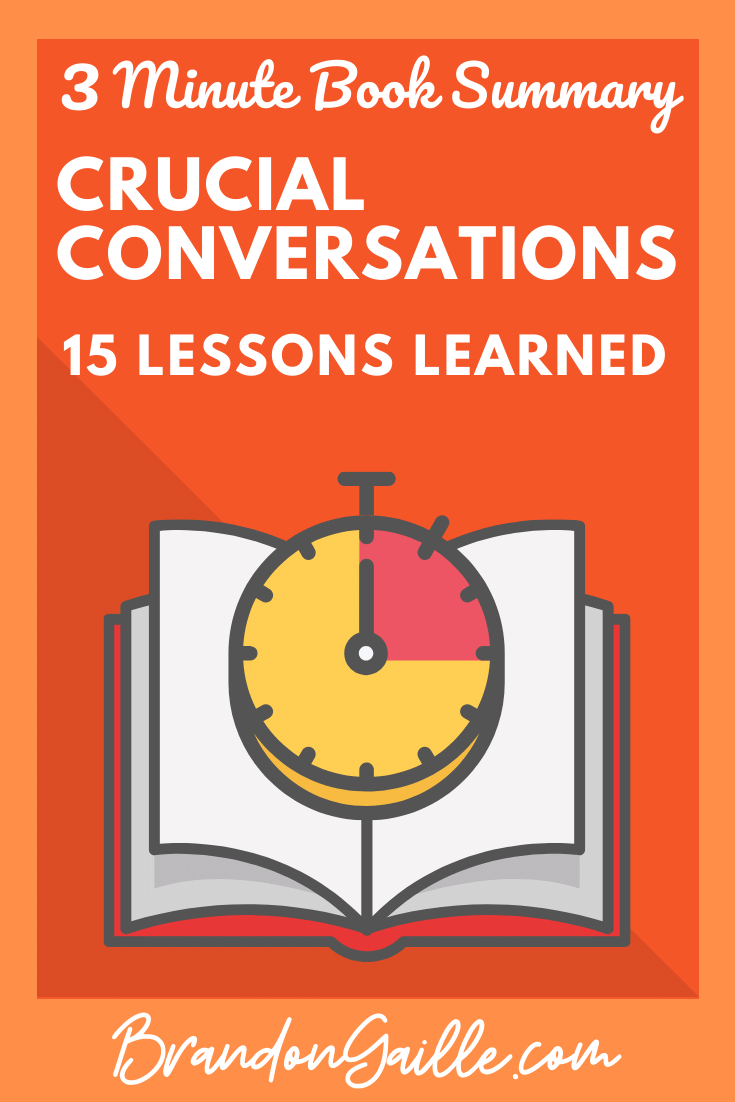The Speed of Trust is a 2006 book by Stephen M. R. Covey. Within, Covey describes techniques that business leaders can use to inspire trust in both their followers and their customers, which is useful when compared to bureaucratic policies that assume maliciousness.
A 3 Minute Summary of the 15 Core Lessons
#1 Trust Increases Business Speed
This book is primarily useful to businessmen and women because it insists that relationships that are founded on trust are much faster, especially when it comes to doing business. Many business relationships are rooted in the idea that both parties can’t trust each other, so certain bureaucratic checks and balances must be maintained for operational security. Covey attests that trustful relationships allow business to proceed more smoothly and quickly.
#2 Trust is Affordable
In keeping with the above, Covey contests that relationships that are founded on trust can lower the cost of your business model. This is because making transactions go more smoothly and quickly necessarily lowers your operating costs. It also avoids having to pay exorbitant fees for certain bureaucratic security measures that people who trust each other do not need.
#3 Trust Yourself First
Before you can trust others, you have to first trust yourself. Covey likens trust to self-confidence, which is only created when your competence and your character integrity come together. You must first trust yourself by developing four major aspects of your personality and leadership style.
#4 Integrity, the First Trust Aspect
Businessmen and women who are trustworthy will always have integrity. Covey describes integrity as the ability to be honest whatever you can, even if you mess up or make a big mistake that costs your business time and money. This vulnerability is rarely seen in the business world, but it is absolutely crucial for any trustworthy person.
#5 Good Intention
Covey says that the second major trustworthy attribute is content. You need to develop a positive intent for your actions and business model rather than simply trying to earn short-term profits. You may need to develop a new intent after learning this. But chasing after riches is not a good intention that will net you trustworthy relationships in the long run.
#6 Know Your Capabilities
Trustworthy people understand their own capabilities and will work to develop new skills and capabilities over time. You need to be able to practice those things you aren’t good at and understand your own skill limitations when offering your services and talking to others.
#7 Results
Trustworthy business leaders will have the results that can back up their claims to integrity. Sometimes this takes a bit of time to build up, but Covey says that are trustworthy record is worth more than even the most charismatic persuasive speech. A good track record can also stand-in for a demonstration of your capabilities to potential clients and business partners.
#8 Contribute to Build Trust
When you’re building trust within a business or with your employees, it’s often a good idea to contribute as you can. Giving back to your people and organization, either in the form of effort or your time and attention, is a way to build trust that reflects back on itself and paints you as a worthwhile individual with which to build a relationship. It’s a lot like marketing for yourself.
#9 The Trust Tax
Covey says that we now live in a society that suffers from widespread general distrust. This manifests in a so-called “trust tax” which causes people to be less open with their actual desires and fears and which slows the speed of progress and business. It limits economic activity and makes people less likely to take positive risks.
#10 5 Trust Waves
Covey organizes the development of a trustworthy person or business as it occurs in five waves. The first wave hits when you develop self-trust and credibility in yourself. For a business, this may manifest as trustworthiness in the CEO or another executive.
#11 Relationship and Organization Trust
The next two waves are focused on creating relationship trust between yourself and your employees or business partners. Only when there is a trustworthy relationship between you and your collaborators can you successfully cooperate and do work effectively together. Organizational trust is what happens when everyone within a company or group trusts one another, increasing efficiency and lowering the cost of activity.
#12 Market and Societal Trust
The fourth and fifth waves of trust deal with trust from the market and across society as a whole. Market trust is achieved when you get a good reputation for your business model or your results. This only comes after significant effort has been expended and you have a good track record under your belt. Societal trust is an eventual outcome if everyone practices the above trust-building developments, though it is not always present in today’s day and age.
#13 Smart Trust
Covey does note that it is not always wise to have blind trust in others. You don’t want to necessarily distrust people, but you need to learn how to extend trust without making yourself overly vulnerable or by learning how to spot potential liabilities or those who would abuse your trust. This is a skill that takes some experience to learn effectively, and it only comes when you trust in others.
#14 Restoring Trust
Covey also goes over how to change your behavior and repair any damage you may have done to the trust others holding you. It usually requires a significant amount of self-observation and repeated good behavior, often without the expectation of reward. Restoring trust can happen but it takes exponentially more effort and repeated success than establishing trust for the first time does.
#15 Talk Straight
By far, the best behavior you can adopt when establishing or restoring trust is to talk plainly and simply. Even if you have to deliver bad news or admit to a mistake, being honest and straightforward with your speech will do more to earn the trust of your peers and followers than any other behavior.
Top 10 Quotes from The Speed of Trust
- “We judge ourselves by our intentions and others by their behaviour.”
- “The first job of a leader—at work or at home—is to inspire trust. It’s to bring out the best in people by entrusting them with meaningful stewardships, and to create an environment in which high-trust interaction inspires creativity and possibility.”
- “Trust is equal parts character and competence… You can look at any leadership failure, and it’s always a failure of one or the other.”
- “The best time to plant a tree is twenty years ago. The second best time is today.”
- “In a high-trust relationship, you can say the wrong thing, and people will still get your meaning. In a low-trust relationship, you can be very measured, even precise, and they’ll still misinterpret you.”
- “We judge ourselves by our intentions and others by their behavior. This is why, as we’ll discuss later, one of the fastest ways to restore trust is to make and keep commitments—even very small commitments—to ourselves and to others.”
- “Whether you’re on a sports team, in an office or a member of a family, if you can’t trust one another there’s going to be trouble.”
- “(S × E)T = R ([Strategy times Execution] multiplied by Trust equals Results)”
- “The trust we have in people and in organizations comes, in part, from believing that they do care.”
- “For every thousand people hacking at the leaves of evil, there is one striking at the roots.”
Free PDF Download of the Summary to Save or Print
Go here to download The Speed of Trust PDF Summary.
Stephen M.R. Covey’s Advice to Leaders
Covey Explains The Speed of Trust
Please take a moment to pin this post to Pinterest.

The post Speed of Trust Quick Summary: 15 Core Principles in 3 Minutes appeared first on BrandonGaille.com.




